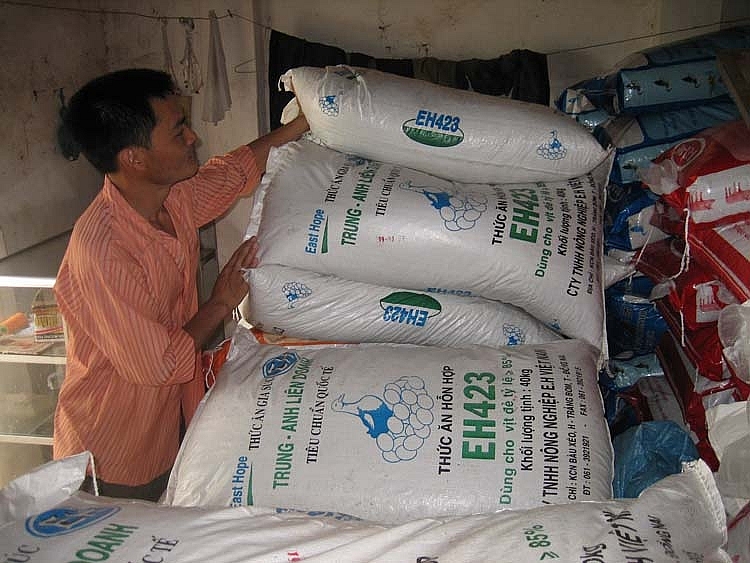 News
News
According to the Department of Livestock Production ( Ministry of Agriculture and Rural Development ), in the first six months of 2023, Vietnam imported 8.2 million tons of animal feed and feed ingredients (equivalent to 3.4 billion USD). , down 3.3% in volume and 7.9% in value over the same period in 2022.
 |
| The price of animal feed has cooled down |
Some main imported materials: corn kernels 3.3 million tons (equivalent to 1.1 billion USD); oil dry of all kinds 2.3 million tons (equivalent to 1.1 billion USD); wheat and barley 978 thousand tons (equivalent to 321 million USD); DDGS (dry wine residue) 450 thousand tons (equivalent to 166 million USD); bran of all kinds 285 thousand tons (equivalent to 70 million USD); rice, broken 237 thousand tons (equivalent to 79 million USD); supplementary feed 190 thousand tons (equivalent to 232 million USD)…
The decrease in the quantity of imported raw materials is due to the increase in the price of imported feed ingredients, so businesses have sought alternative domestic feed sources. China tightens the import of agricultural products from Vietnam, including rice bran and cassava, so these materials are used domestically.
Regarding the price of feed materials, in the first 6 months of 2023, the price of corn kernels decreased the most (5.7%), the price of DDGS decreased by 3.8%; However, the price of extracted rice bran still remained at a high level compared to 2022 (up 4.7%), the DDGS price was equivalent to the same period in 2022.
The price of finished animal feed has decreased by 1.2-3.2% compared to the beginning of 2023, but still remains at a high level compared to the time before the Covid-19 epidemic and compared to the same period in 2022. It is expected that the price of raw materials and finished animal feed will continue to trend down from now until the end of 2023 and the beginning of 2024.
Performing its functions and tasks in the state inspection of the quality of imported animal feeds and domestically produced animal feeds, the Department of Livestock Production detected and made 08 minutes of administrative violations against 08 units and issued a decision to sanction administrative violations against these units with a total fine of 153 million VND.
For imported animal feed, the Department of Livestock Production found that 04 units have imported animal feed with quality not conforming to announced applied standards; 02 units have intentionally corrected and falsified the content in the application file for checking and certifying the quality of imported animal feed on the National Single Window Portal.
Thereby, the Department made a record of administrative violations and issued a decision to sanction administrative violations against this unit with a fine of 137 million VND. At the same time, forcibly destroying 2 lots of imported animal feed; forced to re-export 1 batch of animal feed; forcing the modification of quality information on the label of feed products or technical documents attached to a batch of 1 batch of animal feed products.
For domestically produced animal feed, the Department of Livestock Production detected 2 units with acts of producing animal feed with quality inconsistent with announced applied standards (2 these units were discovered from At the end of 2022, handling administrative violations in early 2023), made a Minutes of administrative violations and issued a decision to sanction administrative violations against these two units with a fine of 16,000,000 VND.
According to the Department of Livestock Production, the inspection and supervision of the quality of animal feeds, especially domestically produced and imported feeds subject to post-inspection and exemption from inspection, has not received much attention at local and national levels. center. The inspection and supervision of the activities of the designated units is also not regular.
Therefore, in the coming time, the Department of Livestock Production said that it will continue to strengthen channels to closely monitor the supply and price of animal feed ingredients in the country and in the world, and take timely measures to direct the situation. in order to minimize the impact on livestock production efficiency in the context of high input prices and quality assurance of animal feed.
At the same time, implement the quality management of animal feed, control the use of banned substances, antibiotics in animal feed. Strengthen supervision of quality management of livestock materials, especially food safety control .
Organize measures to strictly control the trading and transportation of livestock, poultry and related products, especially at border gates, trails and openings in border areas. Coordinating with relevant functional units to handle cases of violations on quality of livestock breeds, animal feed...